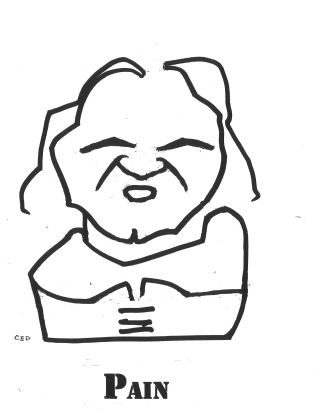ANGER Parents, Adolescents, and the Management of Anger. More mutual irritation can arise as youthful individuality and independence grow.

KEY POINTS-
- Growing distance, differentiation, and disagreement can increase anger between parent and teenager.
- Anger can result from judging that one was wronged by something unwanted, undeserved, or unfair.
- Anger is complicated to manage—it can be protective, but it can also be destructive.
- Eight common violations of well-being are described that can contribute to anger in response.

Adolescence is often a more emotionally charged time in the parent/child relationship as the young person changes on two developmental fronts: becoming increasingly individual and independent.
As the girl or boy become more assertive in both ways, adolescence starts wearing down the old closeness and compatibility of childhood to which parent and child were long accustomed, creating more youthful freedom to develop.
Growing Abrasion
Adolescence is honorably abrasive as the young person pushes against and pulls away from parental authority, socially detaches and differentiates from childhood, forms a second family of friends, and experiments with acting older. All of these dynamics alter the old parent/child relationship.
Thus does adolescence increasingly grow parent and child apart, which it is meant to do. Now increasing separation creates more distance and diversity between them. Now there can be more times of frustration, irritation, opposition, and anger for them both when growing up sometimes makes it often harder to easily get along. As the adolescent increasingly wants to assert her or his own ruling authority, it is easier to become angry when she or he cannot, when freedom is denied.
No love is usually lost as this developmental change unfolds, but maintaining traditional closeness usually becomes harder to do. In the words of one parent who sadly and sincerely missed how things used to be: “Goodbye to childhood!” Thus, adolescence begins with loss and letting go.
Anger Feels Affronted
It can be tempting for parents to feel offended by their more passively and actively resistant teenager who, for independence and individuality’s sake, is less readily compliant and compatible, relating to a young person who now distances, delays, and disagrees to assert more room to grow. But what generally works better for parents than anger and objecting is working with youthful development, appreciating and accepting how adolescence will now change the child, the parent in response, and the relationship between them.
When parental anger does object to this adjustment, it is important for parents to understand their unhappy feelings.
What is Anger?
Anger is often the emotional outcome of an objection to some experience that one judges to be unwanted, unexpected, unfair, or undeserved: “This feels wrong!” “I was wronged!” "Things are going wrong!" Anger protests, complains, and objects.
Mostly, people decide to become angry by declaring that an offense to what is wanted or to well-being has occurred, some complaint is justified, some expression is desired, and some remediation may be needed. Anger is complicated to manage. It can be helpful in some ways and harmful in others.
- To the good, anger patrols violations to one’s well-being and can empowers an expressive, protective, or corrective response: “Stop doing what hurts me!”
- To the bad, anger can inflict harm when feeling injured arouses temper and is used to give immediate injury in return: “I’ll get you back for what you did!”
Anger and Adolescence
Adolescence can be an angrier age as wants for freedom become more urgent and demands of family life become increasingly frustrating. More is wanted by you: “Why can’t I?” And more is expected of you: “Why do I have to?” Parental restrictions and demands become harder to take because both inhibit personal freedom.
As for parents, growing adolescent resistance in the forms of active argument and passive delay can make for a more wary and wearing relationship with their teenager. Now it’s easier to give and take offense with each other.
- For the adolescent, there are independence complaints (“You won’t let me!”) and there are individuality complaints (“You won’t accept me!”)
- For parents, there are independence complaints (“You challenge our rules!”) and there are individuality complaints (“You oppose our values!”)
To some degree, adolescence necessarily wears on the old parent/child relationship. Love still holds, but more distance and differentiation grow.
Causes of Anger
It can help to understand how anger can arise. While there are many causes for anger, consider eight common violations of well-being for parent and teenager that can provoke angry objections to unwanted experiences on both sides of the parent/adolescent relationship:
- Injury from suffering adversity: “I shouldn’t have this hurt or hardship!”
- Stress from excessive demand: “I’m exhausted from too much to do!”
- Frustration from failure of one’s endeavor: “I’m not getting my way!”
- Mistreatment from being hurt by others: “I’ve been dealt with unfairly!”
- Coercion from being made to do the unwanted: “I feel forced to do this!”
- Surprise from facing the unanticipated: “I never expected this to occur!”
- Impatience from having to delay what is wanted: “I hate having to wait!”
- Disappointment from broken hopes: “What I wished for didn’t happen!”
Since generalized anger can be hard to manage because it feels so hard to source, specifying the anger complaint can be helpful. Best to operationally describe violations to be better understood—talk in terms of what did or didn’t happen that gave rise to feeling offended. “At least let’s understand what we’re actually upset about.”
Is Mad Bad?
While anger can feel bad and can cause acting mad, it can be put to many constructive uses. Consider a few:
- To object
- To protest injury
- To identify a violation
- To protect from harm
- To empower correction
- To oppose mistreatment
- To express opposition
- To voice grievance
- To defend rights
- To right wrongs
Of course, on the downside, since it can be manipulatively intimidating and abusive when strongly expressed, never use anger to bully or punish. By example and instruction, parents advise not using threatening anger to wound or get one's way. In the family, anger is to be used for expression, not aggression.
Managing Anger
No question: managing anger can get complicated. You want the support of anger to identify and respond to attacks on your well-being; but you don’t want to be burdened by a sense of grievance all the time or use anger with loved ones to justify doing damage. When angry, you want to express it in helpful, not hurtful ways.
While anger can be a good servant—protesting some violation or protecting against harm—it can be a bad master when it prompts impulsive and destructive acting out. The emotional management task can be a challenging one. Use anger to help identify and respond to violations; but don’t use anger to nourish grievance, to maintain resentment, to justify acting destructively, or to get one's way. Because adolescence is a more emotional time for their teenager, parents need to maintain their own emotional sobriety—when opposed, keeping what they say and do subject to better judgment's rule.
When you are feeling angry, remember: Mental sets have emotional consequences. So, ask yourself: “About what specifically am I feeling angry? And if I changed my mental set (my perception, judgment, or expectation) could I relieve or remove my sense of violation? "I don't have to take what happened personally." However, if truly wronged, ask yourself: Do I need to address some injury or offense? "When you acted that way with me, I want you to know how wounded I felt and why, and what I need to have happen now."
Anger is complicated because it can often be a cover emotion, masking another unhappy feeling, a disguise for feeling frustrated, hurt, threatened, disappointed, hurt, or suspicious, for example. So, when angry it is often worth asking yourself: "Besides anger, what else am I feeling?"
"Don't get angry" is not good advice. There is a place for honest anger. Well used, anger identifies some violation to well-being and can energize making a healthy expressive, protective, or corrective response: "Never mistreat me this way again!"
What parents model is what they fundamentally teach their children. Therefore, manage your anger constructively so your daughter or son can learn to do the same.
- Questions and Answers
- Opinion
- Story/Motivational/Inspiring
- Technology
- Art
- Causes
- Crafts
- Dance
- Drinks
- Film/Movie
- Fitness
- Food
- Games
- Gardening
- Health
- Home
- Literature
- Music
- Networking
- Other
- Party
- Religion
- Shopping
- Sports
- Theater
- Wellness
- News
- Culture
- War machines and policy

